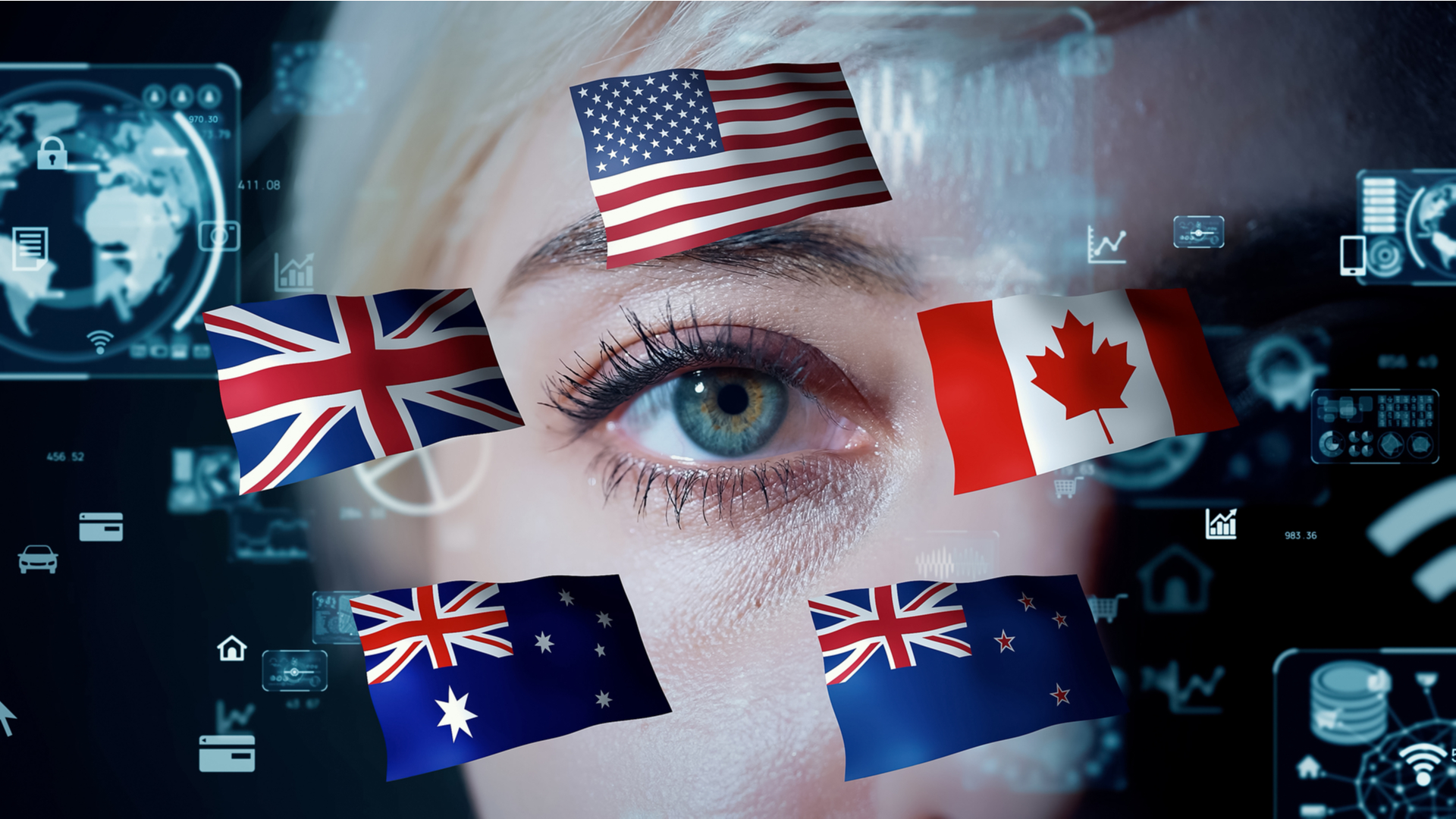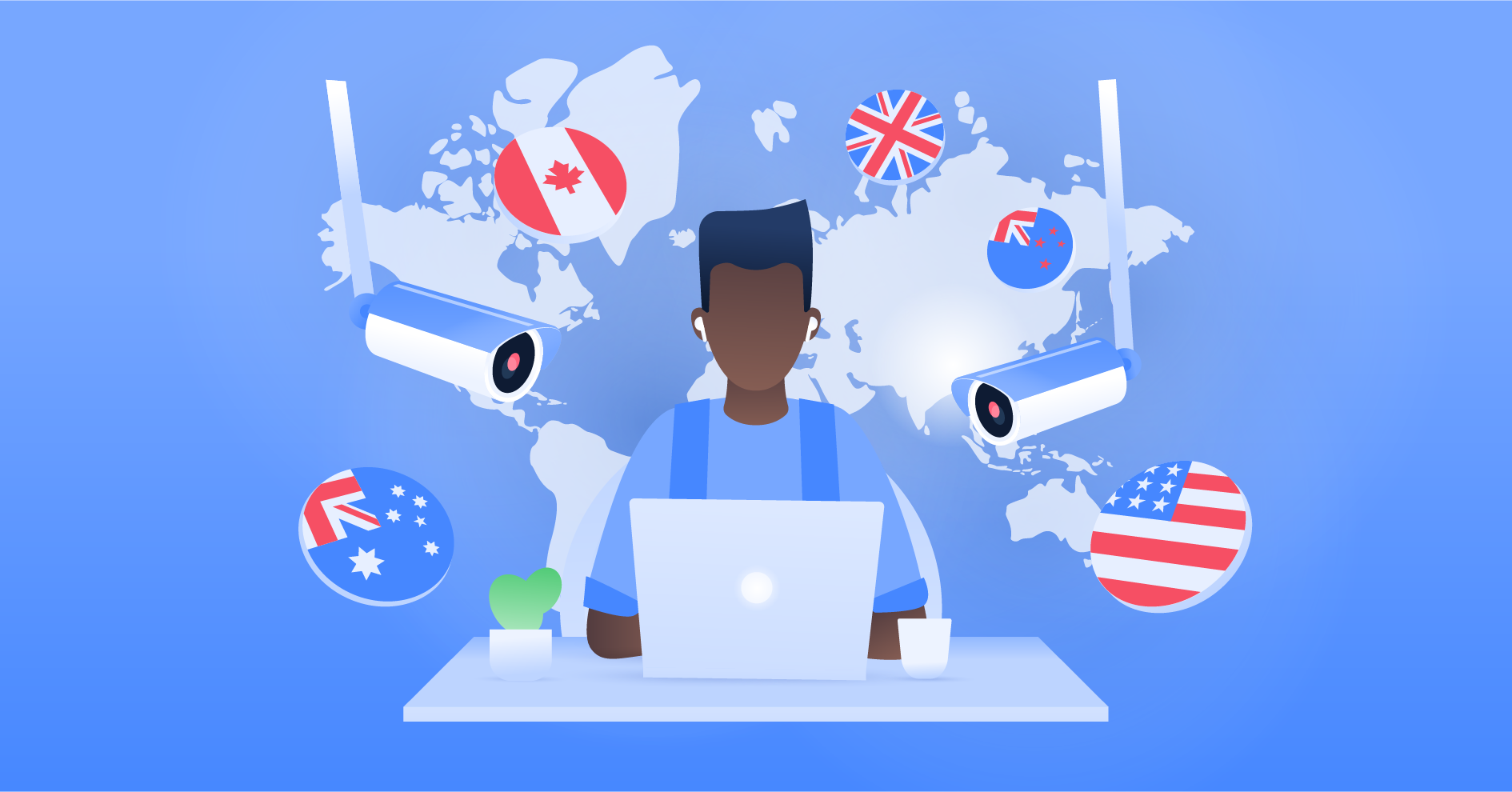5-Eyes, 9-Eyes and 14 Eyes explained: how these alliances affect you
How to evade the Five Eyes' snoopers and protect your privacy

If you're on the hunt for the best VPN services, you've probably come across the Five Eyes, Nine Eyes, and Fourteen Eyes alliances – being based outside a member country is indeed a feature that most providers flagged as advantageous. At this point you're probably wondering: why is that a benefit, though?
These are indeed some intelligence agreements that regulate surveillance methods and data sharing between worldwide nations, with the UK, US, Canada, Australia and New Zealand being their founder members. That's why Canada VPN or US VPN services, for example, are widespread among internet users that are worried about their digital privacy.
Here, we explain what these alliances actually are, how they affect your privacy, and why using a VPN is beneficial if you're living or visiting these countries.
What is the Five Eyes alliance?
As mentioned before, the Five Eyes (FVEY), Nine Eyes and Fourteen Eyes are state intelligence agreements between member countries to collect and share internet users' data in the name of national security.
The Five Eyes alliance is the first coalition to have been created, born in the aftermath of the Second World War. Its five members are the UK, US, Canada, Australia and New Zealand.
From intercepting digital and other forms of electronic communications, they develop new surveillance methods for then collecting and sharing information among each other.

The Five Eyes coalition has grown over time, now including other European countries too. These are referred to as the Nine Eyes and Fourteen Eyes.
The goal is always the same: easily collecting and sharing information among the nations. However, the collaboration across the Fourteen Eyes seems to be less strict and invasive than the other two.
It is also worth noting that a handful of additional countries are suspected to take part to this international intelligence-sharing. Here's a breakdown of the alliances and their members:
- Five Eyes: US, UK, Canada, New Zealand, Australia
- Nine Eyes: the Five Eyes' members plus Denmark, France, the Netherlands, Norway
- Fourteen Eyes: the Nine Eyes' members plus Germany, Belgium, Italy, Sweden, Spain
- Third Party contributors: Israel, Japan, Singapore, South Korea, as well as some NATO countries
The history behind the Five Eyes
In 1946, the United Kingdom and United States signed an intelligence pact - the so-called UKUSA Agreement. During the next decade the rest of the Commonwealth countries - Canada, Australia and New Zealand - joined the coalition. That's when the Five Eyes alliance, as we know it today, was officially born.
The Five Eyes members worked together throughout the Cold War to intercept, decrypt and share intelligence on the Soviet Union. This process, known as the ECHELON surveillance system, developed over time to adapt to new technologies as well as new enemies. In fact, after the 9/11 terrorist attack, the focus shifted on the Middle East and, in recent years, towards China.
While the ECHOLON system was evolving and its monitoring practices increasing, the wider public has been for a long time totally unaware of it. It was only in the early 2000s that the existence of the Five Eyes agreement came to light.
However, the real turning point came with Edward Snowden's 2013 revelations that put light on how FVEY countries - especially the NSA (National Security Agency) and the British Government Communications Headquarters (GCHQ) - are actively spying on their own citizens too.

How do these agreements affect internet users?
With digital communications becoming the norm today, there are more opportunities than ever to gather information on just about everyone using a telephone, smartphone, or browsing the web. And, the existence of these agreements means that these data can be shared among all the member countries at ease.
As the Snowden leaks reveal, one of the most worrying elements about these alliances is that they allow countries to spy on their own people. For example, the UK’s GCHQ cannot legally spy on its citizens but it can ask the US NSA for this data as they are both members of the Five Eyes. This creates the opportunity to easily bypass domestic privacy laws to enforce mass surveillance.
On top of that, new developments in domestic espionage laws - like the UK's Investigatory Powers Act introduced in 2016 - have legalized even more new invasive surveillance tactics.
How can a VPN help?
As we have seen, everything you do online is likely to be tracked - by several parties, for different purposes. That's why using a VPN is the perfect first step if you want to prevent your ISP and government from breaching your online privacy.
Short for virtual private network, a VPN is a privacy software that aims to anonymise your online activities and protect your sensitive information. How? By connecting to one of its secure international servers, you can hide your real IP address location. Plus, all your data will be shielded inside an encrypted tunnel, making it as good as impossible for the Five, Nine or 14 Eyes' authorities to get hold of it - not to mention any other snoopers.
However, not all the VPN services will give you the same level of security and protection, and we would only trust the very best with our own personal information.
First of all, it's important to choose a provider that's based outside these countries. This way you can be sure that the VPN providers won’t disclose or monitor what you do via their servers. Bearing in mind that Five Eyes' members may force your service to hand over your data otherwise.
Some of the top services located in the most privacy friendly jurisdictions are ExpressVPN based in the British Virgin Island and the Panama-based NordVPN.
Using a provider with a transparent, audited no-logs policy is also advantageous. This means that, while some data is kept for functional purposes, your VPN doesn't retain any loggings about your sensitive information. It's impossible to share something that doesn't actually exist.
Our number #1 privacy software is ExpressVPN
From our in-depth testing, we found ExpressVPN to be the greatest VPN out there. Fast connections, 3,000+ international servers, excellent unblocking streaming power, a strict no-logs policy and top-notch security features: it has them all. Most importantly, ExpressVPN is based in the British Virgin Islands, meaning it's outside the Five, Nine or 14 Eyes jurisdictions. Use the 30-day money back guarantee to try it out completely risk-free.

Sign up for breaking news, reviews, opinion, top tech deals, and more.

Chiara is a multimedia journalist committed to covering stories to help promote the rights and denounce the abuses of the digital side of life – wherever cybersecurity, markets, and politics tangle up. She believes an open, uncensored, and private internet is a basic human need and wants to use her knowledge of VPNs to help readers take back control. She writes news, interviews, and analysis on data privacy, online censorship, digital rights, tech policies, and security software, with a special focus on VPNs, for TechRadar and TechRadar Pro. Got a story, tip-off, or something tech-interesting to say? Reach out to chiara.castro@futurenet.com
